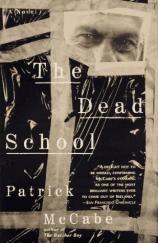Reading Group Guide
Discussion Questions
The Dead School

1.The New York Times Book Review wrote that The Dead School "transfixes through the brilliant manipulation of voice." Discuss the impact of the omniscient narrator voice on the tone and message of the novel. Both Malachy Dudgeon and Raphael Bell, the novel's protagonists, have distinct voices of their own. In what way does this affect the tone and message of the book as well?
2. One of McCabe's primary themes throughout his work is societal repression vs. individual freedom. Though Raphael and Malachy come from different generations, how does McCabe articulate this theme throughout the novel?
3. Do you think Raphael and Malachy can be cast as isolated "madmen," or as examples of the times in which they lived?
4.The Chicago Tribune has written that "Patrick McCabe is a master at depicting the byways of interior lives, particularly those of characters who have a tenuous grasp on sanity." Discuss the moments in the novel when both Malachy's and Raphael's sanity begins to slip--and why. Given the circumstances of both men's lives, could these moments have been prevented?
5. Both Dudgeon and Bell suffered irrevocable losses in childhood. Discuss these losses and their impact on the characters' lives. Are these losses alone enough to have set in motion the psychological damage that leads to the eventual denouement of the novel?
6.The Dead School is told in loosely alternating chapters. Discuss how McCabe uses this as an effective storytelling tool.
7.McCabe has inserted two excoriating--and poignant--fable-like chapters in the novel: "Little Chubbies" and "The Dummy." How do they service McCabe's view of small-town life in Ireland?
8. Discuss McCabe's use of popular culture (rock music, cinema, television) to create an external counterpoint to the inner lives of his characters.
9. How does the role of Catholicism, both as a cultural force and an individual commitment, play an important role in The Dead School?
10.Headmaster Raphael Bell considers the feminist Evans as his nemesis. Can Bell's and Evans's opposing points of view about society and education ever be reconciled? Are his feelings of betrayal in her presence legitimate? Or do they simply arise from his inability to adjust to the changing times?
11.The Dead School can be considered a dark novel, but many have referred to McCabe's use of antic humor throughout. Explore the technique of introducing humor in the novel, and its effectiveness as a storytelling device.
12. Critics have said that McCabe is moving in startling new directions from the magisterial accomplishment of Joyce, Yeats, and Beckett. Discuss why this might be so, and if the author himself is as much a reflection of his time as his predecessors were of theirs.
The Dead School
- Publication Date: September 10, 2012
- Paperback: 286 pages
- Publisher: Delta
- ISBN-10: 038531423X
- ISBN-13: 9780385314237






